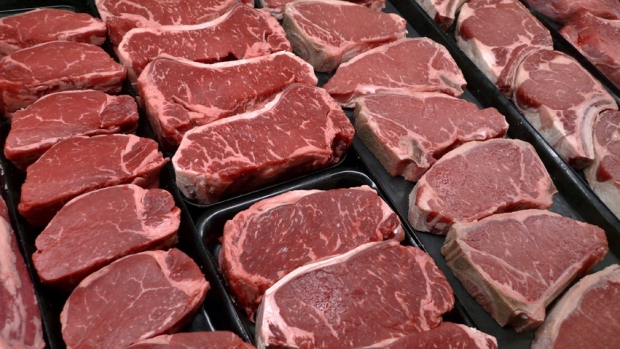‘Ungraded beef’ from Mexico is showing up on store shelves

If you have spotted “ungraded beef” at your grocery store recently – it’s not mystery meat. In fact, officials say it’s completely safe to consume
by Pat Foran – CTV News
“Essentially, you’re getting a product that is safe to eat, it is edible, but you don’t necessarily know what you’re getting from a quality perspective,” Sylvain Charlebois, senior director of Dalhousie University’s Agri-Food Analytics Lab, told CTV News Toronto.
About 80 per cent of the beef sold in Canada is produced by local farmers, with the remaining roughly 20 per cent imported to the country each year.
“Countries outside of North America often use a different grading system which is why it is labelled in Canada as ungraded”Charlebois said price-conscious consumers are looking for deals, so grocery stores are bringing in more beef from Mexico, which may be slightly cheaper than Canadian beef.
Ron Glaser, vice-president of corporate affairs for Canada Beef, said grading is a quality indicator, not a safety indicator.
When you buy beef from Canada, Glaser said, the grading system gives shoppers a better idea of what product they’re purchasing.
“The highest grade is Canada Prime, followed by Canada Triple A and Double A. The vast majority of Canadian meat sold in Canada is Triple A and Double A,” Glaser explained.
Beef from Mexico may have a different taste and texture to Canada’s, Glaser said, due to the type of livestock used in production.
“In Canada, we use primarily European cattle genetics, which are very well known for their beef quality and taste. As you go further south, you would have to use other types of cattle, (which are better suited) to manage the heat,” said Glaser.
Charlebois noted ungraded meat could be of a lower quality.
“Typically, ungraded beef from Mexico would come from older bulls or cows,” said Charlebois.
A Loblaw spokesperson told CTV News Toronto in a statement that most of the beef it sells is locally produced.
“We also offer quality cuts from several other countries to provide the best possible value and choice for our customers,” the spokesperson said.
“Countries outside of North America often use a different grading system, which is why it is labelled in Canada as ‘ungraded,’ but it is always quality beef. We remain fully committed to sourcing Canadian-raised beef and supporting the people who produce it.”
Loblaws adds the Canadian Food Inspection Agency inspects all imported meat, including beef, and approves it for the stores.
Charlebois said as grocers try to keep prices down at the meat counter, shoppers may see more Mexican beef on store shelves.












